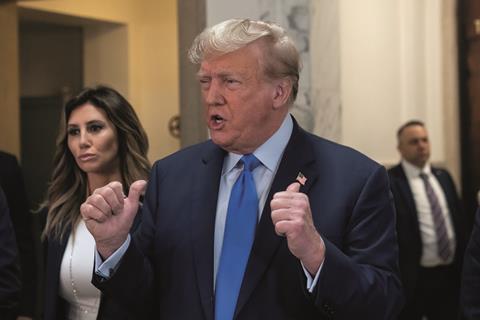Former US president Donald Trump is on trial or facing trial in half a dozen criminal and civil cases. The most serious one involves his role in alleged efforts to overturn the 2020 US presidential election.

But the case that has drawn attention and widespread smirking from the property world is taking place in a New York City courthouse, where Trump is accused of fraudulently overvaluing his real estate assets by billions of dollars to get favourable loan and insurance terms.
It is a sorry spectacle for the American political system, but entertaining for Trump’s real estate rivals who relished the public exposure of his sometimes comical way of valuing his holdings.
The judge in the $250m (£203m) civil fraud trial, Arthur F Engoron, claims that Trump’s $2.2bn estimate of his assets was not an accurate reflection.
The judge – seemingly unaware or uninterested that lenders and insurers rely on their own due diligence, not on a mogul’s word – claims that Trump overvalued his assets by $812m between 2014 and 2021 to $2.2bn.
Engoron noted that in a financial statement known as an SFC (statement of financial condition), Trump claimed that the Trump Tower triplex penthouse apartment where he lived was 30,000 sq ft – although it was widely known to be 10,996 sq ft.
Trump and his lawyers “absurdly suggest that ‘the calculation of square footage is a subjective process that could lead to differing results or opinions’”, Engoron wrote.
The judge’s move to take away Trump’s licences might not stand up on appeal. Engoron has been unanimously overruled at least twice on real-estate-related matters by higher courts. But if he prevails this time, it isn’t altogether clear what Trump will actually lose.

His stake in the New York holdings that bear his name is murky. Even at his flagship Trump Tower on Fifth Avenue, the company owns only the office and retail portions (the latter is home to a large Gucci store); most of the skyscraper consists of individually owned condo apartments.
The Trump Organization owns the long-term leasehold on 40 Wall Street. (Trump once told me it was for 500 years, but it’s for closer to 100 years.) However, the landmark 1930s office tower is in trouble. Early this year, Fitch Ratings downgraded a portion of a security tied to it to junk when its office occupancy sank to 83%. Then, in October, it lost its crucial ground-floor retail tenant – pharmacy and general goods store Duane Reade, which had more than 20,000 sq ft.
At other ‘Trump’ properties, his company owns a smattering of bits and pieces – for example, the garage and restaurant space at Trump International Hotel and Tower at Columbus Circle; and Trump World Tower, a condo building near the HQ of the United Nations.
Courting controversy
The court proceedings devolved into a circus this week when Trump took the witness stand to defend how he valued such holdings as private golf club Mar-a-Lago in Palm Beach. A Florida appraiser cited by the state attorney-general said it was worth only $27m, while Trump claimed that it was worth $1.5bn. Independent appraisers pegged the truth at $300m.
Trump, rambling and raving on the stand, called the prosecutor and the judge “frauds” and defended his “great job” as president. The judge ordered him to “stop making speeches”.
Trump’s way with the truth has always been a joke. Before he entered politics, he routinely described himself as being worth $4bn – perhaps double the reality.
He seems happy to lie to himself. In the years after the 9/11 attacks, before new towers went up, Trump told me (“sadly” as he put it) that his 40 Wall Street was, since the loss of the World Trade Center, “the tallest building downtown”.
It was not. But he insisted, even after I reminded him that nearby 70 Pine Street stood 30ft taller than 40 Wall Street, that his was “much taller”. Neither public records nor a simple look up at the sky could budge his belief.
And Trump will still believe he’s right, even if the building is no longer his.
Steve Cuozzo is real estate correspondent for the New York Post





























No comments yet